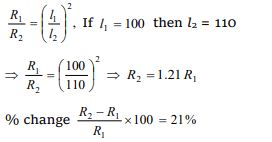1. The following four wires are made of the same
material and are at the same temperature. Which
one of them has highest electrical resistance
a) Length = 50 cm, diameter = 0.5 mm
b) Length = 100 cm, diameter = 1 mm
c) Length = 200 cm, diameter = 2 mm
d) Length = 300 cm, diameter = 3 mm
Explanation:

2.The colour sequence in a carbon resistor is red,
brown, orange and silver. The resistance of the
resistor is
a) \[21\times 10^{3}\pm 10 \] %
b) \[23\times 10^{1}\pm 10\]
c) \[21\times 10^{3}\pm 5 \] %
d) \[12\times 10^{3}\pm 5 \] %
Explanation: Red, brown, orange, silver red and brown represents the first two significant figures.

3.A thick wire is stretched so that its length become
two times. Assuming that there is no change in its
density, then what is the ratio of change in
resistance of wire to the initial resistance of wire
a) 2 : 1
b) 4 : 1
c) 3 : 1
d) 1 : 4
Explanation:

4. The length of the resistance wire is increased by
10%. What is the corresponding change in the
resistance of wire
a) 10%
b) 25%
c) 21%
d) 9%
Explanation:

5. The electric field E, current density J and
conductivity \[\sigma\] of a conductor are related as
a) \[\sigma=E/j\]
b) \[\sigma=j/E\]
c) \[\sigma=jE\]
d) \[\sigma=1/jE\]
Explanation: \[\sigma=j/E\]
6.Two wires that are made up of two different
materials whose specific resistance are in the
ratio 2 : 3, length 3 : 4 and area 4 : 5. The ratio of
their resistances is
a) 6 : 5
b) 6 : 8
c) 5 : 8
d) 1 : 2
Explanation:

7. Two resistors of resistance \[R_{1}\] and \[R_{2} \] having
\[R_{1} > R_{2} \] are connected in parallel. For equivalent
resistance R , the correct statement is
a) \[R > R_{1} + R_{2} \]
b) \[R_{1} < R< R_{2} \]
c) \[R_{2} < R < \left(R_{1}+ R_{2} \right)\]
d) \[R < R_{1} \]
Explanation: Equivalent resistance of parallel resistors is always less than any of the member of the resistance system.
8. A wire of resistance R is divided in 10 equal parts.
These parts are connected in parallel, the
equivalent resistance of such connection will be
a) 0.01 R
b) 0.1 R
c) 10 R
d) 100 R
Explanation: Each part will have a resistance r = R /10

9. There are 8 equal resistances R. Two are
connected in parallel, such four groups are
connected in series, the total resistance of the
system will be
a) R / 2
b) 2 R
c) 4 R
d) 8 R
Explanation:

10.Three resistances of one ohm each are connected
in parallel. Such connection is again connected
with 2/3 Ω resistor in series. The resultant
resistance will be
a) \[\frac{5}{3}\] Ω
b) \[\frac{3}{2}\] Ω
c) 1 Ω
d) \[\frac{2}{3}\] Ω
Explanation:
